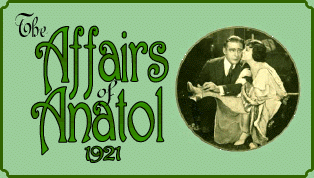

Paramount Pictures
Cast: Wallace Reid (Anatol DeWitt Spencer), Gloria Swanson (Vivian Spencer), Elliott Dexter (Max Runyon), Bebe Daniels (Satan Synne), Wanda Hawley (Emilie Dixon), Theodore Roberts (Gordon Bronson), Monte Blue (Abner Elliott), Agnes Ayres (Annie Elliott), Raymond Hatton (Hoffmeier), Theodore Kosloff (Nazzer Singh), Julia Faye (Tibra), Polly Moran (orchestra leader),
Anatol deWitt Spencer and his wife, Vivian,
are newlyweds. Vivian is a doting wife who, in her own childlike
way, is playful and somewhat overly affectionate. Although Anatol
is more serious-minded and would like less of the 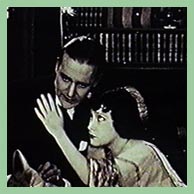 playfulness,
they are still very much in love.
playfulness,
they are still very much in love.
One evening at a nightclub, they encounter a former schoolmate of Anatol's - a young lady named Emilie who is the "companion" of a much older, yet wealthy, man named Bronson. Anatol decides he must save this young girl from her life of sin and degradation and tells Vivian he wants to take her home and "rescue" her. Although Vivian is very clear about her opposition to this plan, Anatol does so anyway.
He sets Emilie up in an apartment and tries to expose her to the finer things in life, such as providing her with violin lessons. Anatol soon learns that her only interest is in stealing him from his wife. When he refuses her advances, she returns to Bronson and her old friends making Anatol realize what a fool he has been.
Anatol goes home to Vivian and tells her, "If you ever see me trying to rescue any woman again - for heaven's sake, rescue me!" He then suggests they go to the country - where people are "honest and decent" - so they may "find" themselves.
More trouble awaits in the country, though. Annie and her husband, Abner, who is also the treasurer of their church, are simple, hard-working farmers. Annie dreams of fine clothes and uses the church's money that has been entrusted to her husband to buy some lingerie. When Abner learns of this, he tells her to leave.
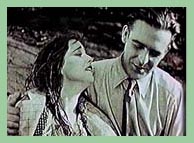 Distraught, Annie attempts suicide by
jumping in a river, but she coincidentally jumps right beside
the canoe in which Anatol and Vivian are spending a leisurely
afternoon. Later, Vivan catches Anatol kissing Annie and leaves
angrily. Anatol later learns that Annie has stolen his wallet
and all his money, and he goes home disenchanted. Once again,
his noble attempts to "save" a woman have resulted in
disaster.
Distraught, Annie attempts suicide by
jumping in a river, but she coincidentally jumps right beside
the canoe in which Anatol and Vivian are spending a leisurely
afternoon. Later, Vivan catches Anatol kissing Annie and leaves
angrily. Anatol later learns that Annie has stolen his wallet
and all his money, and he goes home disenchanted. Once again,
his noble attempts to "save" a woman have resulted in
disaster.
At home, Vivian refuses Anatol's overtures to make up. Angered, he goes out to the "Great White Way" to "forget." He finds New York's wickedest woman, the nightclub entertainer Satan Synne, and goes back to her apartment. When he learns that she is actually a happily married woman who only wanted to get three thousand dollars from him for her husband's operation, he decides the best thing to do is go back to his wife.
However, when he returns home, he finds he is not the only one who has gone out on the town to forget - and with Anatol's best friend!
When Cecil B. DeMille filmed "The Affairs of Anatol" by Arthur Schnitzler, it was already a 30-year old play that was still considered risqué. However, as James Card noted in Seductive Cinema (Alfred A. Knopf, 1994), ". . . the variations and Americanization worked out by scenarist Jeanie Macpherson left absolutely nothing more of Schnitzler than the character names."
The original play took place in Austria and centered around the marital indiscretions of wealthy Anatol deWitt Spencer. Each of his affairs turns out to be a disappointment, and each time he returns to a forgiving wife. DeMille and Macpherson, however, turned Anatol into a "do-gooder" who is constantly finding women in need of "saving." The film does not imply any sexual indiscretions on Anatol's part other than giving in to a goodbye kiss from one of his "rescued" ladies.
The two opening titles tell us:
This is the story of a romantic Young Man who has a passion
for saving Ladies from real, or imaginary, difficulties - always
like Don Quixote, with the most honorable intent. But the wives
of such chivalrous Men are not so philanthropically interested
in saving Other Women's Souls - however noble and sincere their
husband's impulses. And first among these modern Knights, who
start out with the best motives in the firm belief that their
Wives should 'trust' them - is Anatol deWitt Spencer.
In The Films of Gloria Swanson (Citadel
Press, 1984), author Lawrence J. Quirk (nephew of famous Photoplay
editor James R. Quirk) says Reid's character "gets bored
with his wife and searches for erotic adventure . . ." In
The Films of Cecil B. DeMille (Citadel Press, 1969), authors
Gene Ringgold and DeWitt Bodeen state, ". . . he finds fault
with Vivian, his bride, and goes looking for romance. . ."
In Silent Stars (Alfred A. Knopf, 1999), author Jeanine
Basinger says Swanson, as the wife, "suffers the affairs
of a philandering husband." As can be seen from the opening
titles, 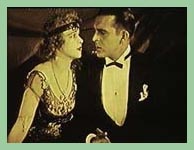 none of these books accurately relates how DeMille
presented the character of Anatol.
none of these books accurately relates how DeMille
presented the character of Anatol.
Instead, Anatol's intentions are noble, albeit naïve. In his first so-called "affair," he has encountered an old schoolmate, Emilie, who, in his opinion, has sunk to the depths of depravity. Here she is in a nightclub with a rich lecher, who is old enough to be her father (or maybe grandfather), drinking bootleg whiskey. When Anatol decides he will "save" Emilie, he tells her, "There is a way out Little Girl: I'm married to the sweetest woman in the world - and she will help you!" Foolishly, he believes Vivian will help him in this noble deed. Nevertheless, the very fact that he wishes to include his wife is evidence that he has no adulterous intentions. Again, he is naïve beyond belief. This is no more apparent than when Emilie tells Anatol, "Your wife doesn't understand you very well - does she?" He just dumbly shakes his head, oblivious to the obvious intentions of this woman.
In spite of the well-meaning, innocent intentions of Anatol, some aspects of the character that DeMille chose to include are a bit confusing. Early on in the film, we see Vivian as a very playful young newlywed who can't keep her hands off her husband (mussing his hair, for example) and talking baby talk to him. Anatol appears to be annoyed by her child-like behavior and impatient with her. This, coupled with his admission to Emilie that his wife doesn't understand him, does seem to lay some groundwork for a straying husband, which he is not. Why DeMille chose to portray this side of Anatol is puzzling since it apparently doesn't have any bearing on his "affairs."
Reid is satisfying in the role of Anatol, his suave good looks lending well to the character of the wealthy charmer he portrays. However, for some reason, he looks rather "weak," especially in the area of the eyes. The broad smile and flashing eyes of films such as "The Roaring Road" and "Excuse My Dust" from a year or two earlier aren't there. In her autobiography, Swanson said, ". . . although I never saw him take drugs, his behavior never seemed quite right during 'Anatol.'"
The most accepted explanation for Reid's addiction to drugs revolved around an accident that occurred during the filming of Valley of the Giants in 1919. Supposedly, he was given morphine for severe back pain and blinding headaches and soon became addicted. His wife, however, said he became addicted when given morphine by a New York doctor during the filming of Forever in 1921 (filmed after Anatol).
So, it is unclear whether or not Reid had a problem with drugs during the filming of Anatol, but his appearance seems to indicate a less healthy Wallace Reid than two years before.
Gloria Swanson is excellent as the longsuffering wife, and, as always, she is at her best when she is given the opportunity to express anger. Swanson's standout physical feature is her eyes which, with the firm line of her jaw and clenched teeth, convey an anger that one would do well to take seriously.
She is given this opportunity many times, but best in the last third of the film after she has caught Anatol kissing the country girl, Annie. She writes in her diary, "Have decided to leave Anatol -- thank goodness I haven't any children!" Although Anatol tries to convince her to forgive him, she is adamant. For a moment, when he gives her a bouquet of flowers, we think she may be conceding to his charms, but the conversation goes from bad to worse with Swanson getting angrier all the time. Then, when Anatol threatens to go out on the town "to forget," she throws the flowers down visciously and walks away.
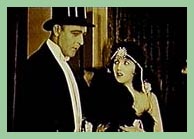 Having just given birth to her first child,
Swanson noted that she was having some post-natal problems during
the filming of Anatol. This, coupled with the fact that
her husband didn't want her to do the picture and Reid was giving
her "the jitters," left her with unpleasant memories
of the making of this movie. Nevertheless, the only complaint
the viewer can have about Swanson in this film is that there's
too little of her.
Having just given birth to her first child,
Swanson noted that she was having some post-natal problems during
the filming of Anatol. This, coupled with the fact that
her husband didn't want her to do the picture and Reid was giving
her "the jitters," left her with unpleasant memories
of the making of this movie. Nevertheless, the only complaint
the viewer can have about Swanson in this film is that there's
too little of her.
Bebe Daniels is another of the film's cast of whom there's too little screen time. Although her portion is only about 20 minutes of the film's 117 minutes of running time, it is all delightful! She plays the vamp Satan Synne sexily and enticingly, with possibly a little "tongue-in-cheek," as well. The New York Times reviewer apparently liked Daniels' performance, too, noting that she "does one of the best mock vampire acts."
During the silent era, Wanda Hawley was
certainly not in the same stellar plane as Reid, Swanson or Daniels,
but her portrayal of the young flapper/kept woman Emilie in Anatol
is excellent. There is one particularly cute sequence when she
is very disinterestedly taking violin lessons from the stuffy
Hoffmeier (with Raymond Hatton a perfect choice for the part).
Three of her girlfriends are there, as well, constantly disrupting
the lesson. She soothes Hoffmeier's temper by putting her arm
around him, consoling him with a flirtatious smile, and then turning
to her girlfriends and winking at her success. When the girls
put on a jazz record, Emilie can't resist and she begins to dance
around while still holding the violin. Hoffmeier has finally had
enough. He heads for the door with Emilie 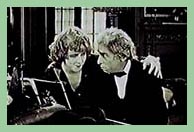 behind him still
shimmying.
behind him still
shimmying.
Hawley is given more screen time and a bigger role than either Agnes Ayres or Bebe Daniels. She is provided ample opportunity for a range of emotions - disappointment when Anatol tells her to throw her jewels away, devilishness when she figures out how trick Anatol and keep her jewels, coquettishness in her scenes with the aging wolf Burton, and seductiveness in trying to win the noble Anatol.
Agnes Ayres is convincing as the country wife, Annie, and Monte Blue does a superb job as her self-righteous husband, Abner. Again, these are two fine performances that are all too brief.
One of the major attractions of "The Affairs of Anatol" is certainly its all-star cast. In addition to those mentioned above (which would be ample for any big-budget picture) are Elliott Dexter, Theodore Kosloff, Polly Moran, Lucien Littlefield, and even a bit part by Elinor Glyn.
In spite of the stellar cast, "Anatol" has some points that are less than satisfying. The sequence with Hawley is rather long, not because of Hawley, but in relation to the other two "affairs." After going through this emotional part of the story (with a grand ending of Anatol destroying everything in Emilie's apartment), we find that we are less than halfway through this almost two-hour film. The story about Emilie takes almost 44 minutes to tell. The overall length of the movie should have been slightly less, and this first story would have been the place to make a few cuts.
Actually, the film was even longer before DeMille cut it. He had planned to name the movie "Five Kisses," and another sequence with Dorothy Cummings as a very athletic, outdoors-type was included. However, for whatever reasons, DeMille decided to drop this sequence from Anatol's series of "affairs."
As mentioned before, Anatol is first shown as being somewhat impatient with his wife and mildly intolerant of her playfulness. Added to this is his confession to Emilie that his wife doesn't understand him. Everything in a well-constructed film should contribute to the understanding of the whole work. These traits that we are shown in Anatol seem out of place for the character DeMille has developed.
It is obvious the overall character of Anatol is supposed to be that of a faithful husband who is a "do-gooder," yet naïve about the good in the women he meets. Why he kisses Annie (the country wife he saves from drowning) is puzzling. Are we to believe he really could be unfaithful to his wife? Equally as puzzling is why he seeks the company of Satan Synne. Are his intentions to be unfaithful, or is this just a mild diversion because he had a fight with his wife? DeMille doesn't make Anatol's intentions clear, which, for the sake of the censors, was no doubt the way he meant it to be.
We must give DeMille credit. He obviously meant to push the envelope on the censors of the day, and no one was better at it than he. It's clear from viewing "Anatol" that sex is there, but it's never thrown in your face. As in the episode with Satan Synne, the viewer is always left to make some assumptions on his/her own.
The DVD version of "The Affairs of Anatol" is digitally mastered from an elaborate original print featuring hand coloring, stencil coloring, and dozens of changes in color tint and tone. Presented at a visually correct projection speed of 21 frames per second, it also includes a digital stereo score compiled by Brian Benison from authentic silent cinema music. This is another stunning work from David Shepard and Film Preservation Associates.
copyright 2002 by Tim Lussier, all rights reserved